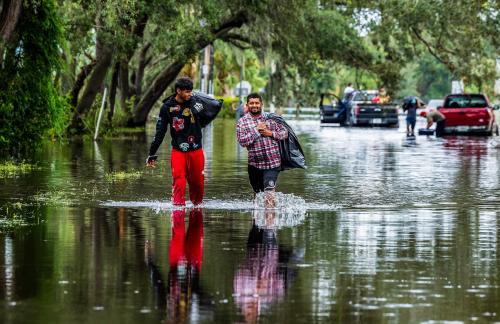Whether you believe global climate change is caused by human-driven carbon emissions or unicorn flatulence, it is inarguable that the issue of energy is an enormous national security concern. Our nation’s dependency on nonrenewable and often foreign sources of energy does everything from bolster the power of illiberal regimes that control oil reserves to indirectly finance terrorist groups. Yet, even if none of these factors was in play, a new report out by the Brookings Institution, titled “Fueling the Balance,” argues that our nation needs a defense energy strategy because of simple military pragmatism.
Our Department of Defense is the largest consumer of energy not just in America, but the world. It burns more petroleum in the course of its operations than any other private or public organization, as well as more than 100 nations, including Sweden, Pakistan and Iraq.
While some might weigh the environmental ramifications, we should think about this dependency in the way those in uniform must. Our forces in Iraq and Afghanistan are bound by what one Marine general called “the tether of fuel.” Roughly half of these operations’ logistics is solely the movement of fuel, most of which is not even for combat vehicles. Indeed, three of the four least fuel-efficient Army vehicles are trucks that haul fuel, echoing how Civil War armies had massive mule trains that followed them, ironically carrying mostly hay for the mules.
This doesn’t just tie our forces down to long supply lines, vulnerable to enemy attack, but costs soldiers’ lives. An Army study found that a mere 1 percent improvement in energy efficiency would mean that troops in Iraq would have to serve on 6,444 fewer convoy missions, a role considered one of the most dangerous in the operation.
The financial costs are also considerable. In 2007, the military consumed 5.5 billion gallons of petroleum at a price of $12.6 billion. This figure reached roughly $20 billion in 2008 and is rising. The same massive use happens at military bases, which burn more than 30 million megawatt hours of electricity per year, costing more than $2 billion. Ninety-eight percent comes from the civilian market, which also makes our bases highly susceptible to the increasing spate of large-scale outages (caused by accidents and over-demand, as well as cyber-attack).
These costs are best understood as severe lost opportunities. For instance, every $10 increase in the price of a barrel of oil costs our military $1.3 billion. This is equivalent to a loss of almost the entire U.S. Marine Corps’ procurement budget.
In short, thinking “green” about military energy would make our forces more agile, save lives, and increase the part of the military budget that actually gets spent on troops and new weapons rather than lining the pocket of some foreign leader or oil speculator. But while the Pentagon has recently made baby steps with a few pilot energy savings programs, it doesn’t have an overarching strategy that sets clear goals or policy for the years ahead.
The energy issue is of such importance that it should be established in the Quadrennial Defense Review, the document that determines the Pentagon’s overall vision of strategy, programs and resources every four years. With the next QDR due to Congress in early 2010, a closing window of opportunity must not be missed.
This is not just a matter of recognizing the climate issue or lauding the few, already existing programs, as often happens in such documents. In order to drive real change, a defined target finally needs to be enunciated in Defense Department energy use, such as a policy goal to be a net-zero energy consumer at its bases by 2030. This will guide action, as well as help provide top cover to the innovative programs being worked on at lower levels to unleash our forces from the tether of fuel.
Underlying this should be goals to shift all bases to “smart” power grids, fully account for the costs of fuel in deciding which systems to buy (just like buyers are doing now in “Cash for Clunkers”), and support research competitions into technologies to help the force reduce its dependency, as well as benefit the civilian market.
The issue of energy has too long been looked at only through an environmental lens, and real action too often deferred. It is high time we address the long-standing irony of fueling our national defense from a source that threatens our nation’s security.
The Brookings Institution is committed to quality, independence, and impact.
We are supported by a diverse array of funders. In line with our values and policies, each Brookings publication represents the sole views of its author(s).



Commentary
Op-edFueling Our Security: The Need for a Defense Energy Strategy
August 25, 2009